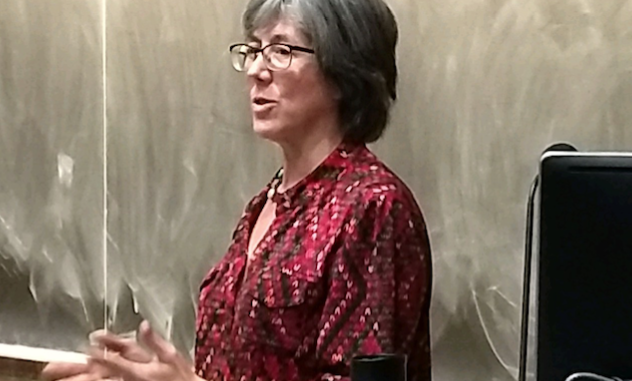
One of the biggest problems facing our environment is the overabundance of plastics in the ocean. Over 8 million tons of plastics are dumped in the ocean every year, and 99 percent of it is unaccounted for. It seems daunting even approaching this issue, let alone solving it.
However, New York Public Interest Research Group (NYPIRG), and guest speaker Iris Bloom of Protecting Our Waters aim to educate students on the issue by presenting the documentary “Oceans: The Mystery of the Missing Plastic,” directed by Vincent Pérazio. The film was screened on Nov. 28 in the Lecture Center.
Iris Bloom is the director and founder of Protecting Our Waters, a grassroots environmental group based in Philadelphia. Founded in 2009, Protecting Our Waters has been dedicated to ensuring the safety and conversation of not only Pennsylvania’s environment, but the environment of the Hudson Valley as well.
Bloom and her group have been instrumental in the efforts to ban single use plastics in the region as well as protests against the Pilgrim Pipeline, a proposed pipeline that runs straight through several New Jersey and New York counties, including Ulster County.
While the group is concerned with all environmental issues, their main area of concern lies in the pollution of oceans, groundwater and surface water. Naturally, they see plastic littering the world’s waters as a massive issue.
“We work on the plastic issues because it’s a public health issue and climate issue, as well as an ocean issue,” Bloom said.
New Paltz’s NYPIRG chapter hosted the event, as well as fourth year environmental science major Paige Golembeski. She had been with them over the summer and was a canvasser with them.
Golembeski also coordinated the event, and Eric Wood, the Mid-Hudson regional coordinator for NYPIRG at SUNY New Paltz, provided assistance. Wood made the suggestion to have Bloom speak at the event.
“When I talked to him about doing the movie screening, he said ‘Oh, let’s get Iris Bloom to come and speak about her efforts in Ulster county.’” Golembeski said.
The film tackled the issue of plastics residing in our oceans and how for the most part, we don’t know where 99 percent of it is. The film deduces that this is due to the fact that 99 percent of these plastics are most likely microplastics, pieces of plastics that are either less than five millimeters in size or are from the degradation of a larger plastic product making them hard to track.
The film details how these plastics not only kill and drastically alters oceanic wildlife, but it also shows how they poison their bodies upon consumption and in turn poison us when we consume them.
After the film, Bloom talked with the attendees about personal strategies to reduce their use of plastics so this would be less commonplace. A flyer detailing said strategies as well as a petition to ban single use straws in New York state were passed around. She shared strategies of her own, which involve using reusable cutlery and refusing to-go-bags and cups, as well as straws. Bloom even had a few of the attendees role-play scenarios in which they refuse a server offering them a plastic straw at a restaurant.
The reaction to the event was mostly positive, with many feeling that they were more informed about plastics by the time the event ended.
“It was super informative,” said fourth year international relations and geography major Leith Kusmider. “It was an aspect of pollution to really look at.”
Kusmider also praised Bloom’s suggestions, but also wished some time of the program was devoted to talking about the presence of single-use plastic bottles on campus.
Golembeski wants students to be inspired by the screenings and cut down on their plastic use.
“I hope that they’re more aware of how their plastic use affects oceans and nature,” Golembeski said. “Even just reducing their plastic use by a little bit by not using plastic bags or straws… that can really make an impact.”
For upcoming projects, Bloom and Protecting Our Waters have plans to get Marbletown, New York on 100 percent renewable energy by the year 2030, while balancing relatively smaller projects like the effort to ban single use plastics in New York State.
“We’re campaigning for positive change,” Bloom said, “[The]100 percent renewable campaign is a big step, and we’re always making these big and small steps simultaneously.”
On NYPIRG’s end, Wood has nothing set in stone for next semester, but he and NYPIRG will be paying close attention to the New York State legislature.
“The New York State legislature [will pick] back up. They work about six months out of the year— January through June,” Wood said. “While they’re in session, we start to plan around that.”
